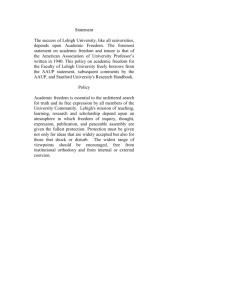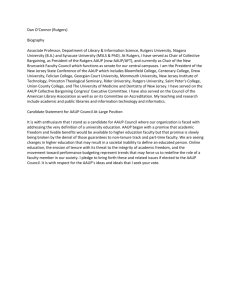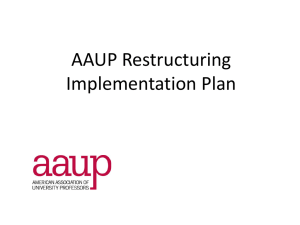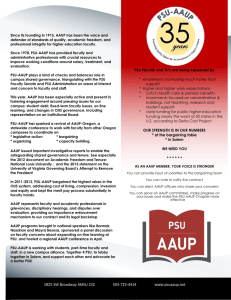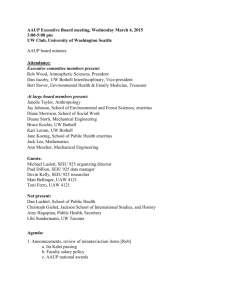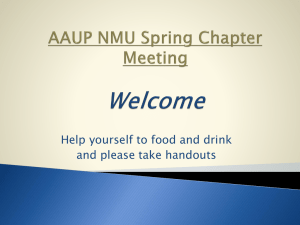In my two decades of work on postsecondary instruction, I have
advertisement
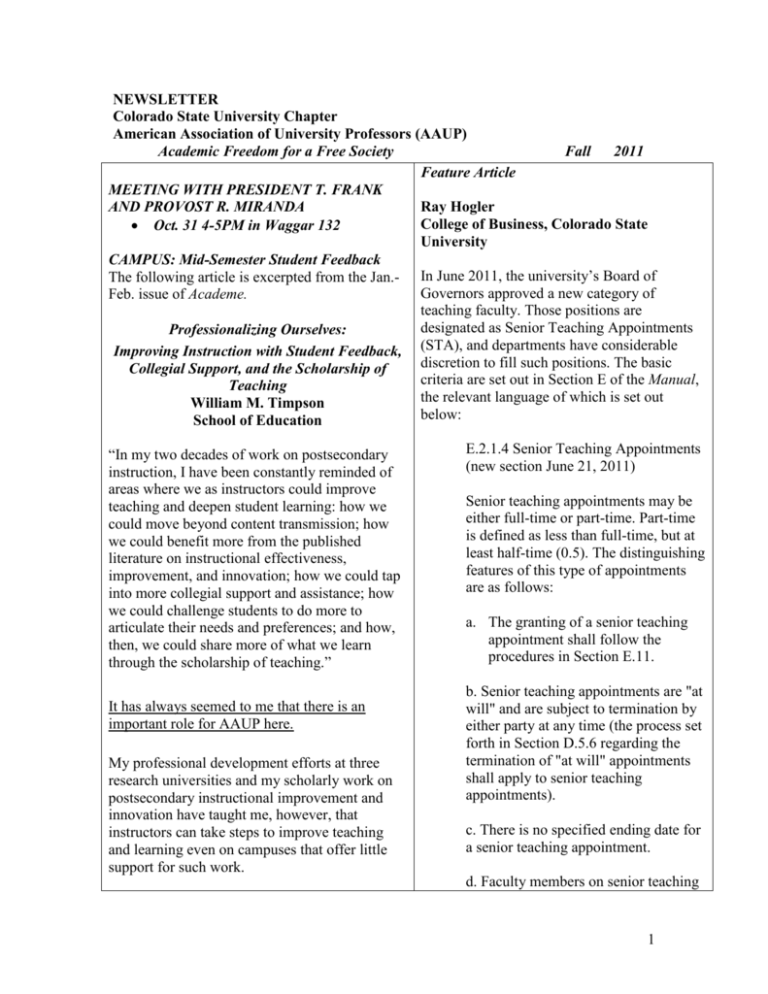
NEWSLETTER Colorado State University Chapter American Association of University Professors (AAUP) Academic Freedom for a Free Society Fall 2011 Feature Article MEETING WITH PRESIDENT T. FRANK AND PROVOST R. MIRANDA Ray Hogler College of Business, Colorado State Oct. 31 4-5PM in Waggar 132 University CAMPUS: Mid-Semester Student Feedback The following article is excerpted from the Jan.- In June 2011, the university’s Board of Governors approved a new category of Feb. issue of Academe. teaching faculty. Those positions are designated as Senior Teaching Appointments Professionalizing Ourselves: Improving Instruction with Student Feedback, (STA), and departments have considerable discretion to fill such positions. The basic Collegial Support, and the Scholarship of criteria are set out in Section E of the Manual, Teaching the relevant language of which is set out William M. Timpson below: School of Education “In my two decades of work on postsecondary instruction, I have been constantly reminded of areas where we as instructors could improve teaching and deepen student learning: how we could move beyond content transmission; how we could benefit more from the published literature on instructional effectiveness, improvement, and innovation; how we could tap into more collegial support and assistance; how we could challenge students to do more to articulate their needs and preferences; and how, then, we could share more of what we learn through the scholarship of teaching.” It has always seemed to me that there is an important role for AAUP here. My professional development efforts at three research universities and my scholarly work on postsecondary instructional improvement and innovation have taught me, however, that instructors can take steps to improve teaching and learning even on campuses that offer little support for such work. E.2.1.4 Senior Teaching Appointments (new section June 21, 2011) Senior teaching appointments may be either full-time or part-time. Part-time is defined as less than full-time, but at least half-time (0.5). The distinguishing features of this type of appointments are as follows: a. The granting of a senior teaching appointment shall follow the procedures in Section E.11. b. Senior teaching appointments are "at will" and are subject to termination by either party at any time (the process set forth in Section D.5.6 regarding the termination of "at will" appointments shall apply to senior teaching appointments). c. There is no specified ending date for a senior teaching appointment. d. Faculty members on senior teaching 1 Soliciting Student Feedback appointment are not eligible for tenure (see Section E.10.4). “In several publications, I have described the importance of feedback to student learning as well as our own teaching. My recent book with Sue Doe (also a CSU AAUP member)— Concepts and Choices for Teaching: Meeting the Challenges in Higher Education—describes the range of instructional options that we have and how each is strengthened by feedback, how, for example, the use of cooperative groups requires our active monitoring to be most effective or the assessments we can productively make from observing students work through a discovery lesson.” e. Faculty members on senior teaching appointments shall have effort distributions with at least 50% of the effort being in the category of teaching and advising and at least 5% of the effort being in the category of service. “In particular, I have explored the role of feedback in the performing arts, where directors, choreographers, and performers are engaged in a continuous process of communication, feedback, exploration, and improvement. (See my book, Teaching and Performing, with colleague Suzanne Burgoyne.)” g. Department and college codes shall specify the voting rights of faculty members with senior teaching appointments and their eligibility to participate on departmental and college committees. The standard expectation is that faculty members on senior teaching appointments shall be included fully, except with regard to personnel matters involving regular faculty members, including the department chair. “In my own classes, I routinely conduct a midsemester student feedback session to identify problems while there is still time to address them. I usually take about thirty minutes to reflect on what has happened to date, both positive and negative, and consider possible areas for improvement.” For those of us at CSU, know that the MidSemester Student Feedback provides opportunities for additional sources of information on teaching as per the faculty manual, i.e., Mid-Semester results, a letter from a peer facilitator. (See E.12.1 Teaching and Advising) f. Faculty members on senior teaching appointments shall participate in annual reviews and the annual salary exercise in the same manner as faculty with regular full-time and regular part-time appointments. h. These individuals are required to enroll in the retirement program and are eligible to participate in other benefits offered by the University as described in the Academic Faculty and Administrative Professional Benefits and Privileges Handbook and in Sections F and G of the Manual. They are not eligible for sabbatical leave. The new approach to faculty appointments raises some issues of interest to AAUP “Using the standard course survey gives students members. We have been working for several practice with the form that will be used at the end years to change the Colorado law that designates all non-tenure track appointments at of semester, a practice that is recommended by “employment at will,” meaning those psychometricians as a way to increase ‘rater 2 reliability.’ I ask every student to complete the form individually and to list three aspects of the course that they appreciate and three concerns that they have. I also insist that they link any concerns to concrete recommendations for improvement.” employees can be fired at any time for any reason except an illegal one, regardless of the terms of the appointment contract. The STA designation cannot, and does not, change this rule. Note that section b explicitly incorporates the at will status by reference to section D.5.6 of the Manual. That section deals with the “After ten minutes or so, I invite them to join me termination of administrative professionals in a full class discussion of some of these items. I because of performance. The relevant language will ask a student to offer an aspect of the course is as follows: that he or she appreciates and then ask the student to explain why he or she appreciates it. D.5.6 Formal Procedures for My intent is to encourage students to explain Dismissal of Administrative their reasoning in ways that others can Professional on Grounds of understand. I then ask everyone to indicate his or Unsatisfactory Performance (last her level of agreement on the scoring sheet using revised June 22, 2006) a scale that ranges from ‘strongly agree’ to Pursuant to State Statute, C.R.S. 24‘strongly disagree.’ I ask for a show of hands for 19-104, all administrative each of these responses so that I can better gauge professionals are “employees at will” the experience of the entire class and, if and their employment is subject to necessary, explore any disagreements further, termination by either party at any then and there.” time. The authority to terminate most administrative professional has been For example, in a recent graduate class on delegated to the President by the leadership development, students offered a range Board. The vice president in charge of ideas for improvement, specifically to clarify of an academic department or what was expected with the required case study administrative unit must review and work. Earlier, two students who had approve any recommendations subsequently dropped the course, had concerning the termination of complained bitterly to the Director of the School administrative professionals on any of Education how they felt shortchanged by a grounds, except for terminations at format in class that had students in a central role the end of the stated employment participating in role plays and facilitating period, before the action is presented discussions, etc. for final approval. Termination of the Provost, the vice presidents and, if “When I next turn to student concerns, I insist requested by the Board, senior that students offer concrete recommendations, administrators (as defined in Section and we repeat the public polling and discussion.” B.1) requires final approval of the For example, in this class on leadership Board. Otherwise, the Board has development, nearly all students appreciated the delegated the authority for final innovative use of RamCT discussions in place of approval to the President. the 9-10 PM time slot. However, two admitted Two important issues arise from the change in that they did not do so well in online the Manual and the new category of faculty environments and preferred a more traditional appointments. The first issue involves the face to face approach. We agreed to split the difference and extend class time when we needed extent to which the STAs are given 3 to but to work to make the online environment rich with discussion. “In nearly twenty years of using the midsemester student feedback process, I have seen no downside. Students value the time taken to affirm what is working, identify concerns, and consider improvements. We often talk about rights, responsibilities, and the inherently shared nature of learning. Everyone appreciates the opportunity to make improvements before the semester ends. Students appreciate being asked, heard, valued, and included.” “This mid-semester process can be expanded to include a range of other practices, formal and informal. For example, I try to come to class early to chat with students, check in with them about what is working, and inquire about concerns they might have. I routinely stay after class to answer student questions as well. Some instructors will also ask for feedback on a particular day’s class in “one-minute papers.” These papers can then be discussed in the next class session.” Facilitating Feedback “The mid-semester evaluation process can be extended by inviting a colleague into the classroom to conduct a feedback session. I myself have conducted these kinds of sessions for others on three different campuses for nearly twenty years. While scholars like psychiatrist William Glasser—recommend that we conduct feedback sessions—he referred to them as “classroom meetings”—in our own classes and promote the open, honest, and responsible communication that underlies effective instruction and deeper student learning, most students value the presence of a third party, which can provide integrity, confidentiality, and neutrality. Even when students want to express positive feedback, some fear that their comments will be interpreted by peers as an effort to curry favor with the teacher.” employment security under the new provision, and the second issue concerns the other contingent faculty now working at CSU. The termination process for APs and STAs does have a review process attached. A person who is discharged during the term of the agreement can appeal to an upper-level administrator. Apparently the President must give final approval, but presumably that is a routine procedure and not a concluding stage of appeal. Note also that if an AP or a STA is simply not rehired at the end of the contract term, then there is no appeal and no recourse. Consequently, the new teaching position may be much less than meets the eye with respect to job security. The second issue is more problematic. Some fortunate teachers may be given the STAs, but there is nothing that requires a department or college to fill such positions. The result is that the vast number of contingents working at this institution can be fired or not renewed with absolutely no recourse. The university chapter of AAUP has been working for some time with Rep. Randy Fischer to change the state law and make contracts enforceable documents rather than sham agreements. Last year Rep. Fischer introduced a bill that exempted teachers in higher education from the status of “at will” public employees. It also required institutions to provide a minimal level of due process to those individuals by requiring a statement of reasons for termination or non-renewal of a contract and access to any grievance procedures available at the institution. The bill died in committee after an intense campaign against it by lobbyists for the community colleges. We are continuing to talk with Rep. Fischer about this effort. In the meantime, there is an alternative 4 Again, we in AAUP can aid our colleagues by offering this service to each other. “Before I conduct these sessions, I talk to instructors about any specific questions that they want me to ask and about what problems they think may exist. I like to observe the class for the first twenty-five minutes and take a few notes. I will use the “instructional map” that I developed to refer to the published research and serve as a springboard for later discussions. (I describe this instrument in my 1999 book, Metateaching and the Instructional Map).” “Afterward, I visit with the instructors, share my reactions, and hand over the course surveys from the students. Whether classes are small or large, this process can produce affirming and constructive feedback. Instructors value the feedback, ideas, and support it provides; students appreciate being asked to provide feedback and, invariably, offer useful ideas for course improvement.” The Scholarship of Teaching “Another potential benefit of the mid-semester student feedback process is the relevant data that can be analyzed and reported in publications. In truth, we need more of this kind of analysis from instructors. In another case I facilitated, a colleague wanted help when a student petition surfaced insisting that her classes were “unsafe” for free and open discussion. As the director of the (CSU) Center for Teaching and Learning from 1997-2003, I routinely responded to such requests for assistance from faculty. In this case, I agreed to conduct mid-semester review sessions in all three of her courses the following semester as well as end-of-semester student evaluation sessions and interviews.” “I found a fascinating tension between what had been perceived as a ‘threat’ by certain students in the previous semester and what was seen as a approach that could afford contingents some degree of due process on a localized level. Even if the university fails to act to protect contingents against the harsh effects of the Colorado statutes, nothing prevents the respective colleges from adopting a simple, expeditious process for ensuring contingents an opportunity to be heard before their relationship with the university is severed. A provision such as the draft below could be inserted into a college code. It would be enforceable as a matter of contract because the Colorado Supreme Court has upheld contractual procedures for termination even if the employee is at will. In the event an appointment is terminated or is not renewed, the individual will be given a written statement of the reason or reasons for the termination or nonrenewal. If the individual is not satisfied with the statement, he or she shall have recourse to the following dispute process. 1. The individual will submit a written statement to the hiring authority, normally the department chair or a designee, setting forth reasons for opposing the decision. 2. The department chair or designee will respond in writing within five working days reversing or upholding the decision. 3. If the individual is not satisfied with the response, he or she may appeal to the Dean of the College or the Dean’s designated administrative official. The official will respond in writing within five working days either upholding or reversing the decision of the unit administrator. 5 ‘stimulating challenge’ by students in the subsequent semester. The lengthy report I wrote seemed to end concerns about this instructor’s teaching effectiveness, and she was later promoted to full professor.” “Two peer-reviewed books as well as several chapters and conference presentations emerged from my work with this instructor. Once the instructor and I had received support from Atwood Publishing, we recruited twenty other colleagues on campus to write about their experiences with diverse student populations, in particular. Three years later, we released Teaching Diversity, followed in two years by 147 Tips for Teaching Diversity. Everyone who participated received credit for contributing to these peer-reviewed publications, a concrete reward for the discussions, shared readings, and writing that ensued.” “While we must push for more equity in pay at all levels, we as instructors can do much to improve our own teaching, deepen student learning, and support our colleagues locally and elsewhere. Conducting formal mid-semester student feedback sessions and developing other mechanisms for soliciting input can resolve problems, boost morale, encourage collegial support and assistance, and provide valuable material for the scholarship of teaching.” As time permits, I plan to offer these MidSemester facilitation sessions this Fall as a service for AAUP members and their colleagues. 4. If the individual challenges the Dean’s determination, the final stage of appeal shall be to an ad hoc committee consisting of at least three tenured faculty holding the rank of Associate or above. The committee will be appointed as follows: one member chosen by the dean, one member chosen by the department head, and one member chosen by the individual. The committee will meet and consider the documents submitted in the case, and then render a majority decision in the matter. If the committee finds that the decision was arbitrary, capricious, or discriminatory, the administrative decision will be overturned. The decision of the committee is final and binding on all parties. To sum up, the recent change to the Manual takes a step forward in safeguarding the rights of contingent faculty. It does not go far enough, however, and it does not include all contingents. AAUP is continuing to pursue more extensive job security and a stronger voice for contingent faculty across the state of Colorado. You can help by offering your support and encouragement to AAUP officers. AAUP Update State Conference/Around the State: State Conference News: Steve Mumme New Chapters. The State Conference has two new AAUP Chapters. The Illif School of Theology, an independent unit on the DU campus, has formed its own AAUP Chapter separate of the DU chapter to better represent 6 Non Tenure-Track Faculty Update—Fall 2011: The Year in Review 2010-2011 Sue Doe Spring 2011—Plaza Chalking for NEW FACULTY MAJORITY DAY in late April. After getting a briefing on the context of contingent faculty labor nationwide and locally, nearly 100 students from Natalie Barnes’ Art100 undertook “art as politics” using their artistic skills to deliver a message. See pictures at www.contingentcaucus.wordpress .com faculty concerns at Illif. Naropa University has also revived its defunct AAUP chapter reflecting the need for faculty voice at Naropa. Congratulations to these two new chapters. CSU Pueblo. The AAUP chapter at CSU Pueblo recently met with the American Federation of Teachers to pursue faculty interest in unionization. Faculty support for interim president Julio Leon, appointed by the CSU System Board in 2010 to replace former president Joe Garcia who now serves as Colorado’s Lt. Governor, has been weak. Leon has been criticized for his unwillingness to consult with faculty on budget and other matters. Spring 2011—AAUP members Sue Doe, Laura Thomas, Dave Gilkey and Natalie Barnes coauthored an article “Discourse of the Firetenders: Considering Contingent Faculty Through the Lens of Activity Theory” published in the March special issue of College o In memorium. Sadly, Adrian Anderson, English, which was edited by Sue Doe and Mike former adjunct professor of journalism at CU Palmquist. Contact Sue Doe for a copy. Boulder, lost her battle with cancer this month. Anderson will be remembered for her Fall-Spring 2011--The Committee on Special fierce defense of independent environmental and Temporary Faculty or CoSTF, a new journalism and the shoddy way that CU’s Faculty Council Committee, gained approval administration buckled to big money interests from Faculty Council for two major initiatives who criticized her dynamic pedagogy, refusing affecting contingent faculty—1) a proposal to stand up for academic freedom. An AAUP making contingent faculty eligible for Emeritus report on the Anderson case was completed in status and 2) creation of a new job appointment early September that vindicates Anderson’s type—the Senior Teaching Appointment which critique of CU Administration and points to provides processes for a new category of serious violations of academic freedom that contingent faculty appointment as well as a when joined with other critiques cast CU’s number of potential faculty benefits beyond Boulder campus administration in very poor those afforded traditional special and temporary light. faculty appointments. See the Faculty Manual, o Section E, where faculty appointments are explained. Members of CoSTF include Torsten Academic Freedom Update: The State Eckstein, Chair, (CVMBS), Laura Thomas Conference has given its approval to reports on (CLA), Colleen McKee (CLA), Lori Kogan the Ward Churchill, Phil Mitchell. See the (Tenure-Line Representative) (CVMBS), short summaries below. These reports will be Jennifer Aberle (CAHS), Tracy Richards (CNS), widely distributed and should be available on Lisa Dysleski (CNS), Steve Schaeffer (COE), the state conference website in a month or so. Richard Eykholt (Tenure-Line Representative) The prologue to the report states: (CNS). Phil Mitchell and Ward Churchill are very different sides of the same coin. 7 Fall-Spring 2010-11—Without Term Appointment Letters became more widely available to special appointment faculty, particularly in the College of Liberal Arts where they had not previously been widely used. Discussions about how to implement withoutterm appointment letters remain ongoing in the CLA and elsewhere. Go to http://www.provost.colostate.edu for a sample “without term letter” for Special Appointment Faculty. Fall 2010—Eileen Schell visits campus for CAMPUS EQUITY WEEK in October. Events include a keynote address, viewable at www.contingentcaucus.wordpress.com, a public hearing, a contingent faculty workshop, and breakfasts with the College of Liberal Arts and the College of Natural Sciences which offered major sponsorship of Schell’s visit. Other significant sponsors included TILT. Upcoming Events Fall 2011—Campus Equity Week, October 2428, will feature a series of workshops on the CSU campus, student plaza chalking, and other activities, sponsored by the College of Liberal Arts and other college committees. Stay tuned for details! Jan 28, 2012—The New Faculty Majority, a national nonprofit--501c(6) and 501c(3)--will host the first ever national summit on contingent academic labor at the Grand Hyatt in Washington D.C., dovetailing with the annual conferences of the AAC&U. NFM is seeking nominations for scholarships to attend the conference. Perhaps CSU’s AAUP should nominate someone? Scholarship recipients must be members of NFM. Contact Sue Doe for details. One is a fundamentalist Christian identified with the political right wing; the other is a radical leftist. One was an untenured instructor; the other was a tenured professor with an international reputation as a pioneering scholar in his field. One’s political opinions were known mostly to colleague in his department and perhaps to the congregation in rural Colorado where he serves as a parttime minister. The other wrote an essay that provoked the enmity of a nation. But both, for a period of over twenty years, were among the most popular teachers at the University of Colorado. And both were fired from the University of Colorado because other people did not like their opinions. Because of the University of Colorado’s indifference to the ideals of academic freedom, as abundantly demonstrated in these two reports, the Colorado Conference of the American Association of University Professors (AAUP) recommends that any faculty seeking employment accept a position at the University of Colorado only as a last resort. o Report on Ward Churchill. The AAUP’s report on Ward Churchill finds that the CU Board of Regents’ decision to fire Ward Churchill “stands as a brazen violation of AAUP standards.” Specifically, this extensive and detailed report finds that CU’s administration and Board violated AAUP’s Committee A Statement on Extramural Utterances that states “The controlling principle is that a faculty member’s 8 expression of opinion as a citizen cannot constitute grounds for dismissal unless it clearly demonstrates the faculty member’s unfitness to serve.” Join the AAUP Joining the AAUP says that you’re concerned about academic freedom, and about the way that basic freedom protects your teaching and research. It says that participating in faculty governance is important to you, and that you are concerned about career issues, tenure, and the overuse of contingent faculty. By joining, faculty members, academic professionals, and graduate students help to shape the future of our profession and proclaim their dedication to the education community. In addition, there are many practical benefits--discounts, insurance programs, financial incentives-available to AAUP members. Join your colleagues today to promote and protect your profession. o The state conference also condemns CU administration for violating the AAUP’s 1958 Statement on Procedural Standards in Faculty Dismissal Proceedings, arguing that Churchill was not accorded sufficient time to prepare an adequate defense against CU’s academic integrity allegations, that he was not informed of the procedural standards to be used in judging his work, and that the CU Committee on Research Misconduct appointed members to the independent investigating committee with professional bias and lack of objectivity. o Report on Phil Mitchell. The AAUP’s report on Phil Mitchell finds that CU’s termination of Dr. Mitchell’s appointment violates numerous standards of due process, shared governance, and academic freedom. These violations include a denial of due process in termination and Mitchell’s opportunity to address criticisms of his pedagogy, misrepresentation of the premises of his termination, denial of rights to free expression, and the lack of policies in his unit related to teaching effectiveness or learning assessment. Go to the AAUP website and you can join online using their secure electronic form. At CSU you can contact Bill Timpson William.Timpson@ColoState.edu 491-7630 Steve Mumme Stephen.Mumme@ColoState.EDU 491-7428 Ray Hogler Ray.Hogler@business.colostate.edu 491-5221 Sue Doe Sue.Doe@ColoState.EDU 491-6839 or other members 9
